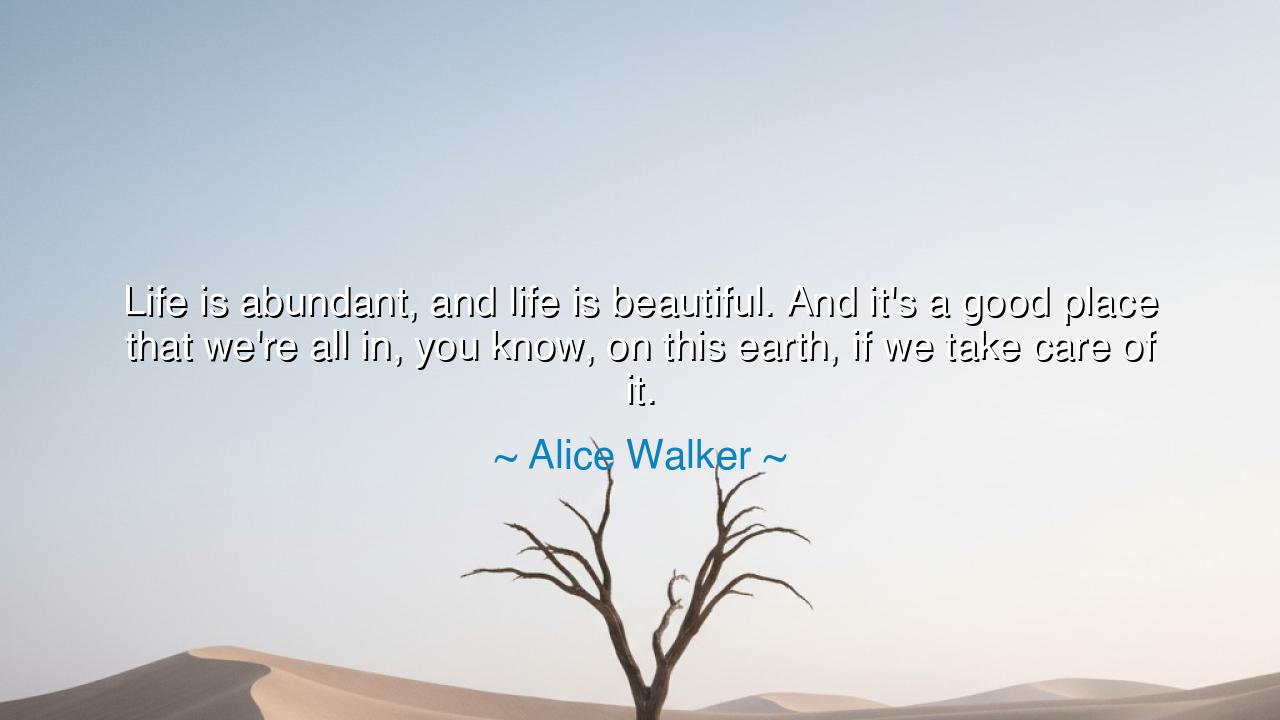
Life is abundant, and life is beautiful. And it's a good place
Life is abundant, and life is beautiful. And it's a good place that we're all in, you know, on this earth, if we take care of it.






Alice Walker, with the voice of one who sees both the wounds and the wonders of the world, declared: “Life is abundant, and life is beautiful. And it’s a good place that we’re all in, you know, on this earth, if we take care of it.” These words fall like gentle rain upon thirsty soil. They remind us that life is not scarcity, but abundance; not despair, but beauty. Yet this treasure, this sacred gift, endures only if we rise as stewards, if we honor the earth as mother and home.
The ancients knew this well. The Egyptians called the Nile a god, for without its waters, there was no harvest, no bread, no life. The Greeks honored Demeter, goddess of grain, for they understood that the earth was not theirs to plunder, but theirs to tend. In every age, the wise have recognized that when man forgets his place as caretaker, destruction follows. Walker’s words echo this ancient harmony: the world is a good place, rich in blessing, but only when we live as guardians and not as conquerors.
Consider the story of Wangari Maathai, the Kenyan woman who began the Green Belt Movement. She planted trees—simple, humble trees—in villages where the land had grown barren and lifeless. Others mocked her at first, but soon the earth began to heal. Streams returned, crops flourished, women found work and dignity. Her act of tending proved that life is abundant and beautiful, waiting only for our hands to care for it. For this work she won the Nobel Peace Prize, yet her true reward was restoring hope to her people and health to the land.
But hear also the warning within Walker’s words: abundance is not eternal if squandered. When forests are burned, rivers poisoned, skies blackened, the beauty fades and abundance turns to famine. Too often, men have traded the sacred for the temporary, destroying what they cannot replace. History tells us of civilizations that rose and fell because they forgot this truth—the fertile crescent turned to desert, Easter Island stripped bare. The lesson resounds: neglect the earth, and you destroy not only the soil, but yourselves.
Yet hope still shines. Every garden planted, every river cleaned, every forest protected is a song of defiance against despair. The earth longs to renew itself, if only we grant it the chance. As Walker says, we are already in a good place—we need not search for another planet, another paradise. Eden is here, beneath our feet, if only we open our eyes to its radiance and act as faithful caretakers.
So, O listener, take this teaching into your heart: rejoice first in the abundance of life. Walk outside and marvel at the sunrise, the flight of a bird, the laughter of children. Let gratitude be your beginning. Then, from gratitude, move into action. Reduce your waste, plant a tree, protect the waters, honor the soil. Care for your community, for in caring for each other you also care for the earth. These small acts, multiplied, sustain the abundance for generations yet unborn.
The lesson is clear: life’s beauty is not a distant dream, but a present reality. But its endurance depends upon your stewardship. If you love the earth, it will return love to you in harvests, in clean air, in joy. If you neglect it, sorrow will follow. Therefore, live as guardians of the abundant and beautiful gift you have been given.
So let this be carved upon the memory of your soul: the earth is good, life is abundant, and beauty is everywhere—if we take care of it. Cherish it, protect it, and pass it on whole. For to honor the earth is to honor life itself, and to dishonor it is to dishonor your very existence. Go, then, and be faithful stewards of the wonder in which you dwell.






AAdministratorAdministrator
Welcome, honored guests. Please leave a comment, we will respond soon